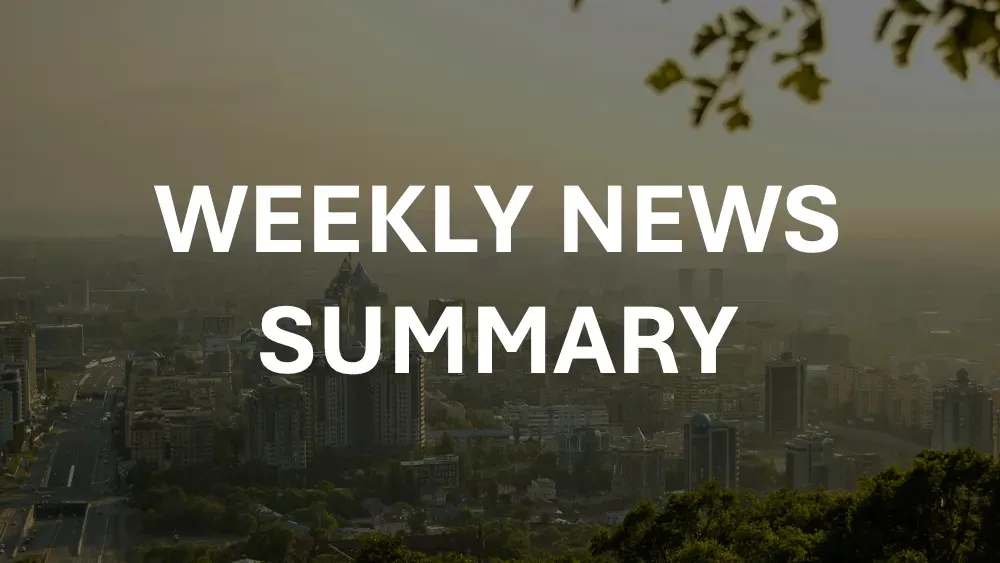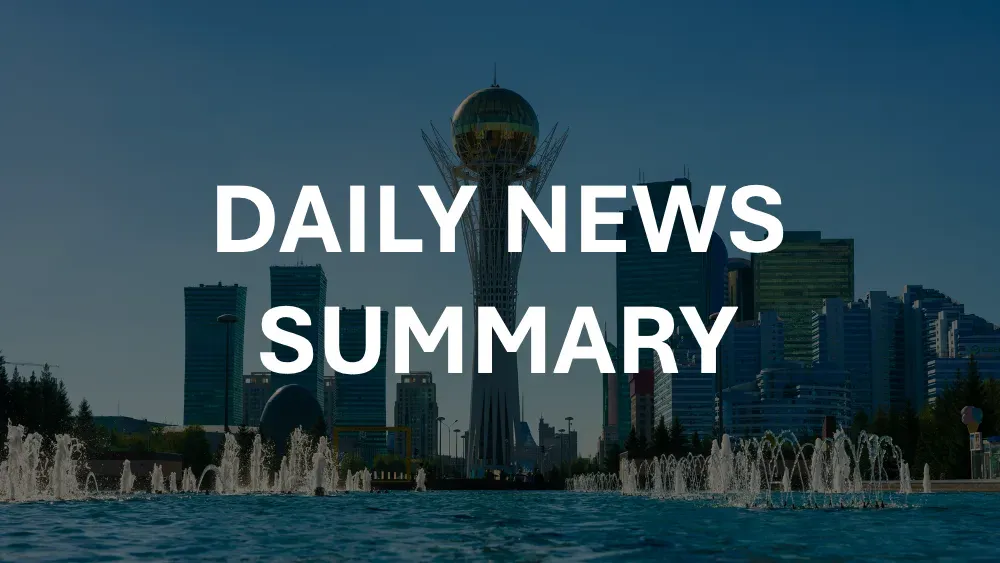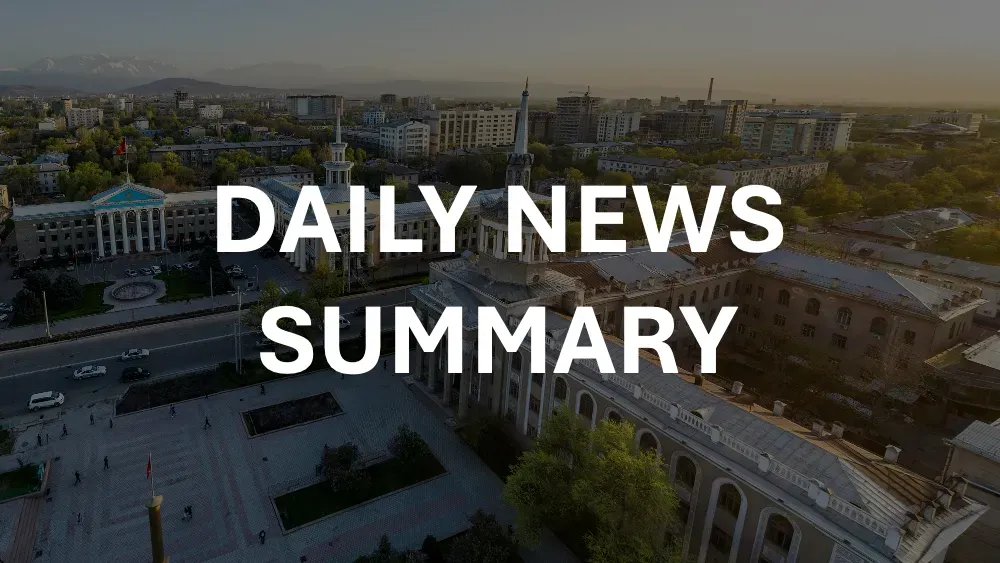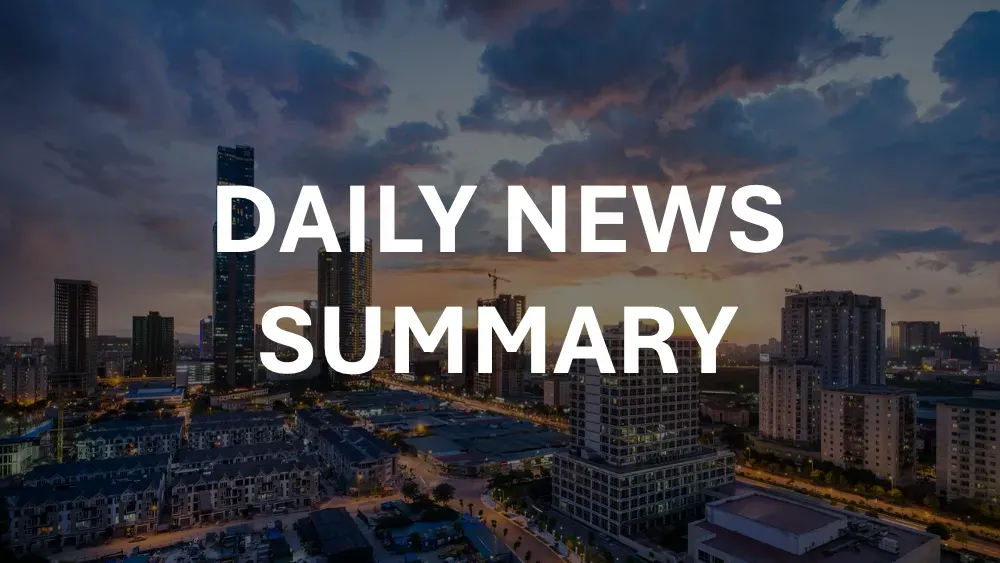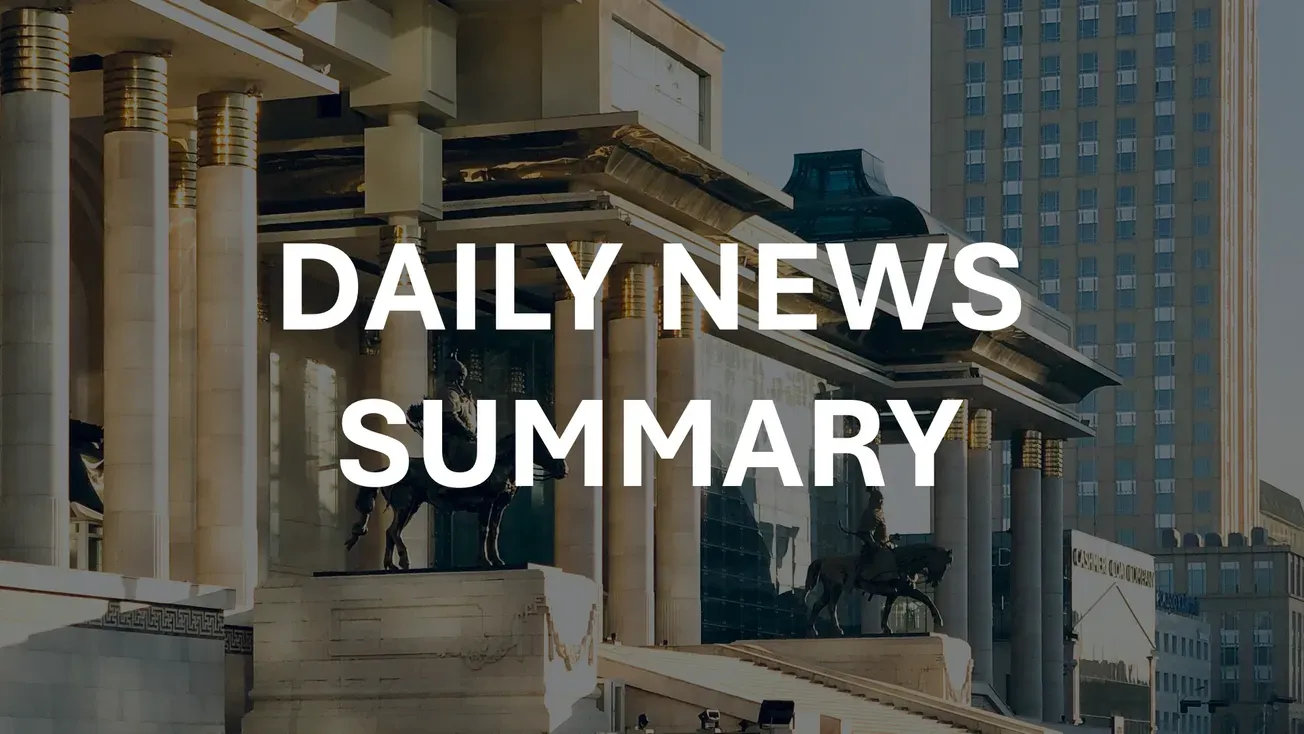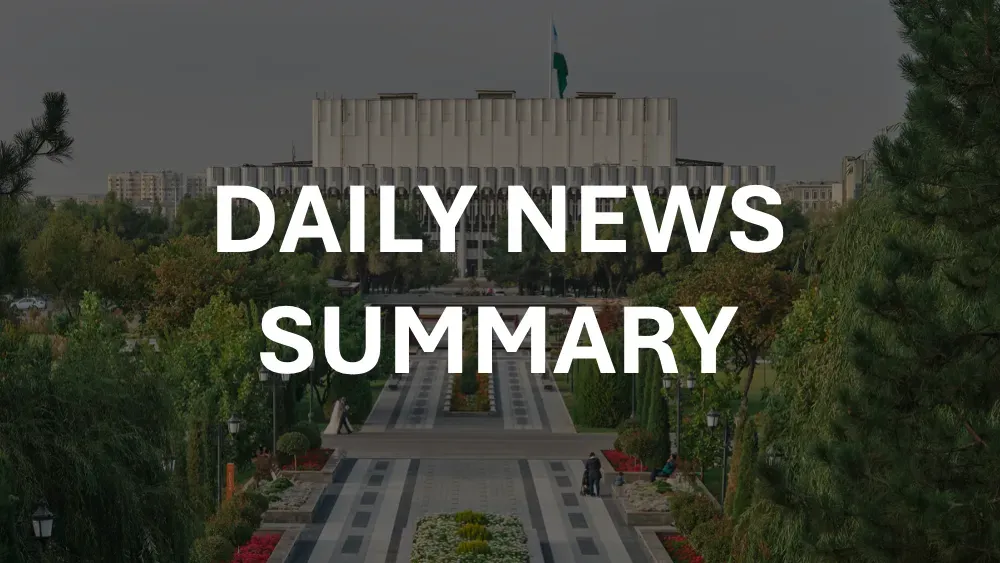This weekly digest showcases just 10 stories. Daily subscribers receive comprehensive intelligence briefs with 40 of the top stories organized by category. Don't miss the stories that matter.
Subscribe to Daily →
October 3, 2025 to October 9, 2025
This week's top 10 stories from Kazakhstan, selected from our daily intelligence briefs.
1. U.S. Senate Confirms Julie Stufft as Ambassador to Kazakhstan, Signaling Focus on Energy and Critical Minerals
The U.S. Senate has confirmed career diplomat Julie Stufft as the next U.S. Ambassador to Kazakhstan, succeeding Daniel Rosenblum. Stufft’s résumé includes senior postings in Moldova, Djibouti, Russia, Ethiopia and Poland, and she speaks Russian, Romanian, French and Polish. Upon confirmation she emphasized mission security—“my primary responsibility will be the safety of all Americans in Kazakhstan, including embassy and consulate staff”—and signaled coordinated economic engagement with U.S. trade and development agencies and private-sector partners.
Her appointment underscores Washington’s strategic focus on energy and critical minerals: Kazakhstan is a major oil exporter and a global leader in uranium production with substantial critical-minerals reserves. Stufft’s confirmation is likely to deepen U.S.-Kazakh cooperation on energy security and supply-chain diversification at a time of heightened geopolitical competition over strategic resources.
Local Coverage: egemen.kz, inform.kz, malim.kz
From daily brief: 2025-10-09
2. Oil Leaders Outline Long-Term Strategy for Tengiz, Karachaganak, and Kashagan during Energy Week Panel
At Kazakhstan Energy Week 2025, a high-level panel of government officials and industry executives — including representatives from the Energy Ministry, parliament, KazMunayGas, the National Geological Service and international operators Shell, Tengizchevroil (TCO), North Caspian Operating Company (NCOC) and Karachaganak Petroleum Operating (KPO) — outlined long-term strategies for the Tengiz, Karachaganak and Kashagan megaprojects aimed at preserving output and returns amid global decarbonization pressures. While no new policy commitments were announced, participants emphasized improving efficiency and profitability through advanced exploration, digitalization and artificial intelligence to unlock additional resources, optimize field development and extend asset life.
The discussion framed innovation as the primary lever for maintaining Kazakhstan’s energy security and competitiveness in global markets; specific operational measures cited included deployment of modern subsurface imaging and data-driven production optimization (no timelines or quantitative targets were released). For international professionals, the session signals a pragmatic strategy: prioritize stable growth and cash generation from existing giants while using technology to mitigate transition risks rather than pursuing immediate structural shifts away from hydrocarbon-led revenues.
Local Coverage: dknews.kz
From daily brief: 2025-10-04
3. Foreign Minister Meets Chinese Ambassador to Advance Trade, Transit and Multilateral Coordination
Kazakh Foreign Minister Yermek Kosherbayev met China’s Ambassador Han Chunlin in Astana to convert recent presidential-level understandings into concrete projects, with priorities on expanding trade and investment and deepening transit and transport links that underpin regional supply chains. Both officials highlighted positive momentum in the Kazakhstan–China strategic partnership and agreed to intensify coordination across multilateral platforms—UN, SCO, CICA and the Central Asia–China format—while exchanging views on current regional and international issues.
No public commitments or figures were released, but the meeting’s emphasis on practical implementation signals near‑term follow‑through on logistics corridors, market access and project financing across key sectors, which could materially affect bilateral trade flows and regional connectivity if operationalized.
Local Coverage: inform.kz
From daily brief: 2025-10-03
4. Government Plans Active Role in Projects as Investment Target Triples by 2029
Kazakhstan has announced a shift from a facilitator role to active organizer and financier of export‑oriented projects, aiming to triple fixed capital investment from $41 billion in 2024 to $103 billion by 2029 and raise the investment‑to‑GDP ratio from 14% to 23%, part of a broader goal to double GDP to $450 billion by 2029. The government plans to mobilize roughly $400 billion for 2025–2029, create an expert‑led Investment Board to identify and steward high‑complexity priority projects, and route financing through development institutions under Baiterek while courting “foreign champions” for technology and managerial capacity in sectors such as grain processing, metallurgy and petrochemicals.
Officials, including Deputy PM and Economy Minister Serik Zhumangarin and Vice Minister Arman Kassenov, emphasize partnership with private firms rather than state takeover, but experts warn the need for transparent project selection, clear roles for banks versus state institutions, and safeguards against inflationary pressures from consumer lending. The approach draws on models from Japan, South Korea and Singapore and will test Kazakhstan’s ability to scale state‑led project management while attracting foreign expertise and mobilizing domestic capital.
Local Coverage: egemen.kz, dknews.kz
From daily briefs: 2025-10-07, 2025-10-08
5. Oil Shipments to Germany Extended Through 2026 with 30% Monthly Increase
Kazakhstan’s government has extended its crude supply agreement to Germany through end-2026, boosting monthly deliveries from 100,000 to 130,000 tonnes. The additional volumes will come from Karachaganak Petroleum Operating B.V., building on flows that began in 2024 via KazMunayGas and expanded in 2025 with Tengizchevroil crude; about 1.5 million tonnes were delivered to the PCK Schwedt refinery in the first nine months of this year. No official statements were cited.
The move increases westbound utilization of the Druzhba corridor, reinforces supply continuity for German refining margins and Central European fuel markets as Berlin diversifies away from Russian crude, and improves export revenue visibility for Kazakhstan by supporting upstream offtake from Karachaganak alongside Tengiz output through 2026.
Local Coverage: egemen.kz
From daily brief: 2025-10-08
6. Transit Diversification Drives Middle Corridor Upgrades and Digitalization Plans
Kazakhstan is fast-tracking upgrades to the Trans‑Caspian International Transport Route (Middle Corridor) as part of a broader push to integrate rail, road, air and logistics hubs into a unified Eurasian transport system. Government plans include modernizing Aktau and Kuryk ports, digitalizing rail operations, expanding capacity at Khorgos, Dostyk and Saryagash, and building roughly 1,300 km of new rail, 12,000 km of roads, three airports and new logistics centers — with an official target to lift transit to 100 million tonnes by 2029. Officials report significant efficiency gains (transit declaration processing cut from eight hours to 30 minutes, per Kazakhstan Temir Zholy CEO Talgat Aldybergenov), while President Kassym‑Jomart Tokayev and Transport Minister Nurlan Sauranbayev stress that digital methods and system-wide integration are essential for revenue and jobs.
Transport ministers and delegations from Kazakhstan, Türkiye, Azerbaijan and Georgia met in Almaty at the New Silk Way forum and signed coordination documents to speed infrastructure, regulatory harmonization and capacity growth across the Caspian and South Caucasus segments. Despite these advances, persistent challenges — border bottlenecks, tariff misalignment, sanctions-driven rerouting, weather constraints at Caspian ports and geopolitical risk — mean the corridor’s scaling will depend on sustained policy alignment and implementation of digital and operational reforms to make the Middle Corridor a viable, resilient alternative for East–West freight.
Local Coverage: egemen.kz, dknews.kz
From daily briefs: 2025-10-03, 2025-10-09
7. Tax Regime Overhaul Aims to Curb Shadow Turnover and Cut Excess Intermediaries
Kazakhstan’s National Economy Ministry, led in commentary by First Vice Minister Azamat Amrin, is reassessing the application of special tax regimes across all sectors to curb shadow turnover and eliminate excessive intermediary chains. The review targets structural inefficiencies that facilitate undeclared transactions and inflate supply-chain costs, and signals potential tightening of preferential tax treatments and compliance for SMEs that currently use simplified regimes.
Officials indicated the approach will be comprehensive and likely coordinated with tax and finance authorities, with phased implementation to match administrative capacity. For businesses, anticipated changes could affect cash flow planning, pricing and contractual arrangements with agents and distributors; firms operating under simplified regimes should prepare for closer scrutiny and incentives tied to formalization. (inform.kz)
Local Coverage: inform.kz
From daily brief: 2025-10-10
8. New Banking Law Introduces Digital Finance Framework and Two-Tier Licensing
A new banking law adopted in early 2025 creates a formal framework to digitize the financial system, regulate digital financial assets, and align domestic practice with international norms, the Agency for Regulation and Development of the Financial Market said. Deputy Chairman Dauren Salimbayev framed the legislation as a strategic modernization step that introduces oversight for digital assets and signals a move to risk‑based supervision and clearer market entry standards for both domestic and global players, potentially unlocking fintech partnerships and expanded digital services.
A central feature is a two‑tier bank licensing regime intended to better match capital and compliance requirements to institutions’ size and risk profile, with separate categories for small banks and microfinance organizations to lower entry barriers for niche lenders and boost financial inclusion for SMEs and retail customers. While the Agency has not published detailed criteria or timelines for licensing transitions, regulators expect the change to foster greater competition, possible consolidation or specialization, and more predictable conditions for international institutions engaging in the market.
Local Coverage: inform.kz
From daily briefs: 2025-10-06, 2025-10-07
9. Presidential Decree Forms Parliamentary Reform Task Force to Draft Unicameral Transition Proposals
President Kassym-Jomart Tokayev on [date of decree] signed a presidential decree establishing a Parliamentary Reform Task Force to draft proposals implementing his 8 September address on overhauling the legislature, including a potential transition to a unicameral parliament. The group is chaired by State Counsellor Erlan Karin, with presidential aides Erzhan Zhiyenbayev and Arman Kyrykbayev as deputies, and includes leaders of parliamentary factions, representatives of both chambers, the Assembly of the People of Kazakhstan, constitutional scholars, think‑tank heads, National Kurultai members and policy experts.
The move formalizes the next phase of institutional reform tied to Tokayev’s broader digital and governance agenda and signals a serious, consultative approach to possibly abolishing the bicameral structure. By assembling senior officials and legal experts, the task force is positioned to produce concrete legislative and institutional proposals that could reshape Kazakhstan’s political architecture; timing and scope will depend on its findings and subsequent presidential or parliamentary action.
Local Coverage: inform.kz, aikyn.kz, egemen.kz, informburo.kz, malim.kz, zakon.kz, dknews.kz
From daily brief: 2025-10-09
10. Tax Authorities to Track Spending and Lifestyle Under Draft Indirect Assessment Rules
Kazakhstan’s Finance Ministry has drafted indirect assessment rules that would allow tax authorities to broaden audits beyond declared income and assets to include spending patterns, lifestyle and consumption, using alternative data sources to detect discrepancies, Aikyn.kz reports. The measures—piloted on influencers in February 2025, which identified 594 cases and 53.3 billion tenge in undeclared income—form part of wider Tax Code changes that will strip 70% of 1,111 activity types (notably many B2B operators) of access to the simplified tax regime.
Authorities and experts portray the reforms as efforts to boost transparency and tighten administrative control; Maksim Baryshev, founder of Uchet.kz, warns that taxpayers must now monitor expenses and living standards as potential bases for assessment. For international professionals these changes signal stronger compliance enforcement, greater use of alternative data in audits, and potential increased risk and administrative burden for businesses operating in affected sectors.
Local Coverage: aikyn.kz
From daily brief: 2025-10-06
About This Weekly Digest
The stories above represent the most significant developments from Kazakhstan this week, selected through our AI-powered analysis of hundreds of local news articles.
Stories are drawn from our daily intelligence briefs, which synthesize reporting from Kazakhstan's leading news sources to provide comprehensive situational awareness for international decision-makers.
These weekly highlights are a small sample of what's happening. Daily subscribers get comprehensive briefings with 40 top stories that connect the dots between events, track developing stories, and provide the context you need for informed decision-making.
Upgrade to Daily →
